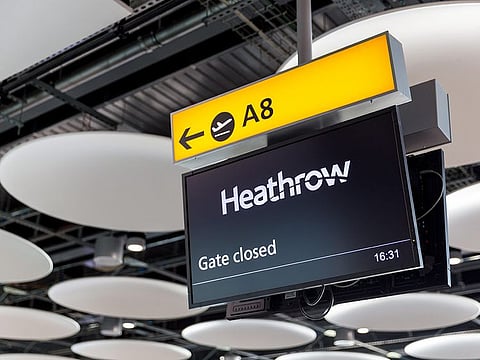Dubai cements status as UK travellers' preferred New Year spot - and ticket rates are helping
Best part is that ticket rates remain within range as UAE airlines double down on flights

Dubai: Dubai is again reinforcing its position as the preferred travel spot for UK travellers, with the Omicron variant failing to make any dent to demand on flights from London.
In fact, Dubai-London Heathrow has been the third busiest international air route in the world this month with 253,567 seats, behind Cairo–Jeddah (282,413 seats) and Dubai-Riyadh (284,000 seats).
“Passenger numbers in the UAE-UK market are soaring to pre-pandemic levels, especially for leisure destinations like Dubai, the Maldives and Mauritius,” said Linus Benjamin Bauer, Managing Director of Bauer Aviation Advisory.
UAE’s airlines have significantly ramped up capacity on the route to meet the demand surge, particularly with an eye on demand in the second-half of December and all the way to the first week of January. “Emirates is operating close to six to seven daily flights to London Heathrow and Etihad is operating three flights,” said Suraj Ramesh from Al Badie Travel Agency.
“There are at least 10 flights moving from UAE to Heathrow and that is giving them enough space to reduce ticket rates.”
Emirates, which has also restarted flights to London Gatwick Airport (LGW), aims to offer 84 weekly flights to the UK by month-end, making it easier for British passengers to access Emirates’ growing network of over 120 destinations.
Fares hold steady
Flights from Dubai to London cost between Dh900-Dh1,500 - and that’s after a recent rise in rates. At the peak of the outbreak last year, ticket prices had shot up to Dh2,000 and over.
Given current levels of demand, rates could steadily push their way into the Dh2,200 range in the next few days.
Europe’s Wizz Air is offering one-stop flights from Dubai to London Luton for as low as Dh320.
A number of European countries have tightened restrictions on travellers from the UK as the country grapples with a sudden spike in Omicron cases. “UK nationals can no longer travel to some three to four countries, and Dubai will benefit from this,” said Ramesh. “Tourists are already coming in to Dubai for Christmas and New Year’s given the ideal weather conditions.
“There will be quite a bit of traffic to UAE until at least January 10.”
Follow these rules, please
Residents, tourists and visitors travelling from or through the UK and arriving in Dubai and Abu Dhabi must have a negative COVID-19 PCR test before departure and present the certificate at check-in. These need to be taken no more than 72 hours prior to departure for arrivals to Dubai and no more than 48 hours prior to departure for arrivals to Abu Dhabi. Travellers arriving in Abu Dhabi will also be required to undertake a COVID-19 PCR test on arrival. Arrivals in Dubai may be required to undertake a further COVID-19 PCR test on arrival and will have to isolate pending the result of the COVID-19 PCR test. If you test positive for COVID-19 on arrival, depending on your symptoms and your accommodation plans, you may be required to self-isolate in a government facility, a hospital, your hotel or privately arranged accommodation for at least 10 days. If you are transiting through the UAE to a country that requires a COVID-19 PCR test on arrival, then you must obtain a negative COVID-19 PCR test before travelling. In all circumstances, the test must be a COVID-19 PCR - other test results including antibody tests are not accepted.
Not quite there yet
Although the UAE-UK route has bounced back rather quickly, it has not quite returned to 2019 levels. “Capacity and demand is rebuilding, but it isn't back to pre-Covid levels yet, as many markets east of Dubai still have some travel restrictions,” said John Grant, Partner at Midas Aviation. “The arrival of Omicron is a concern for all and we can only hope this passes through quickly and with little damage to the industry.
“Unfortunately, it is too early to have a clear view on that.”
Travel bans
With the Omicron variant spreading widely and reaching community transmission in many countries, it makes sense for governments to follow UK’s lead and do away with ‘red lists’ altogether.
“The official travel red lists of countries including the UK now are less effective in slowing the incursion of the virus from anywhere,” said Bauer. “Countries should rather focus on optimising the COVID-19 testing processes for inbound arrivals.
“The removal of the red list (in UK) will benefit UAE airlines in terms of air route recovery and it will also remove the large portion of uncertainty in the network planning process for the upcoming months.”
Sign up for the Daily Briefing
Get the latest news and updates straight to your inbox

